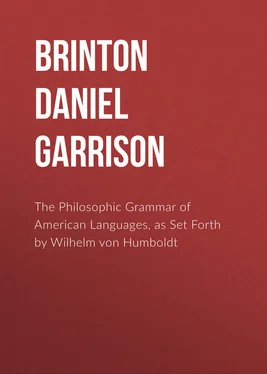Daniel Brinton - The Philosophic Grammar of American Languages, as Set Forth by Wilhelm von Humboldt
Здесь есть возможность читать онлайн «Daniel Brinton - The Philosophic Grammar of American Languages, as Set Forth by Wilhelm von Humboldt» — ознакомительный отрывок электронной книги совершенно бесплатно, а после прочтения отрывка купить полную версию. В некоторых случаях можно слушать аудио, скачать через торрент в формате fb2 и присутствует краткое содержание. ISBN: , Жанр: foreign_antique, foreign_prose, на английском языке. Описание произведения, (предисловие) а так же отзывы посетителей доступны на портале библиотеки ЛибКат.
- Название:The Philosophic Grammar of American Languages, as Set Forth by Wilhelm von Humboldt
- Автор:
- Жанр:
- Год:неизвестен
- ISBN:http://www.gutenberg.org/ebooks/36646
- Рейтинг книги:5 / 5. Голосов: 1
-
Избранное:Добавить в избранное
- Отзывы:
-
Ваша оценка:
- 100
- 1
- 2
- 3
- 4
- 5
The Philosophic Grammar of American Languages, as Set Forth by Wilhelm von Humboldt: краткое содержание, описание и аннотация
Предлагаем к чтению аннотацию, описание, краткое содержание или предисловие (зависит от того, что написал сам автор книги «The Philosophic Grammar of American Languages, as Set Forth by Wilhelm von Humboldt»). Если вы не нашли необходимую информацию о книге — напишите в комментариях, мы постараемся отыскать её.
The Philosophic Grammar of American Languages, as Set Forth by Wilhelm von Humboldt — читать онлайн ознакомительный отрывок
Ниже представлен текст книги, разбитый по страницам. Система сохранения места последней прочитанной страницы, позволяет с удобством читать онлайн бесплатно книгу «The Philosophic Grammar of American Languages, as Set Forth by Wilhelm von Humboldt», без необходимости каждый раз заново искать на чём Вы остановились. Поставьте закладку, и сможете в любой момент перейти на страницу, на которой закончили чтение.
Интервал:
Закладка:
Both of these, it will be observed, begin with the language and its forms, and are confined to these. Philosophic Grammar, on the other hand, proceeds from the universal constructive principles of language, from the abstract formulæ of grammatical relations, and investigates their application in various languages. It looks upon articulate speech as the more or less faithful expression of certain logical procedures, and analyzes tongues in order to exhibit the success, be it greater or less, which attends this effort. The grammatical principles with which it deals are universals, they exist in all minds, although it often happens that they are not portrayed with corresponding clearness in language. 19 19 “Les notions grammaticales resident bien plutôt dans l’esprit de celui qui parle que dans le matériel du language.” Humboldt, Lettre à M. Abel-Remusat Werke , Bd. vii, s. 396. On the realms of the three varieties of grammar, see also Dr. M. Schasler, Die Elemente der Philosophischen Sprachwissenschaft , etc., s. 35, 36, and Friedrich Müller, Grundriss der Sprachwissenschaft , Band 1, ss. 8-10 (Wien, 1876). Schasler observes that a main object in philosophic grammar is an investigation of “die genetisch-qualitativen Unterschiede der Redetheile,” that is, of the fundamental psychological differences of the parts of speech, as, what is the ultimate distinction between noun and adjective, etc.?
Philosophic Grammar, therefore, includes in its horizon all languages spoken by men; it essays to analyze their inmost nature with reference to the laws of thought; it weighs the relations they bear to the character and destiny of those who speak them; and it ascends to the psychological needs and impulses which first gave them existence.
It was grammar in this highest sense, it was the study of languages for such lofty purposes as these, with which Humboldt occupied himself with untiring zeal for the last fifteen years of his life, when he had laid aside the cares of the elevated and responsible political positions which he had long filled with distinguished credit.
§ 5. Definition and Psychological Origin of Language
Humboldt remarks that the first hundred pages or so of his celebrated “Introduction” are little more than an expansion of his definition of language. He gives this definition in its most condensed form as follows: “Language is the ever-recurring effort of the mind to make the articulate sound capable of expressing thought.” 20 20 Steinthal does not like Humboldt’s expression “to make capable” (fähig zu machen). He objects that the “capacity” to express thought is already in the articulate sounds. But what Humboldt wishes to convey is precisely that this capacity is only derived from the ceaseless, energizing effort of the intellect. Steinthal, Die Sprachwissenschaft Wilhelm von Humboldt’s , s. 91, note. The words in the original are: “Die sich ewig wiederholende Arbeit des Geistes, den articulirten Laut zum Ausdruck des Gedanken fähig zu machen.”
According to this definition, language is not a dead thing, a completed product, but it is an ever-living, active function, an energy of the soul, which will perish only when intelligence itself, in its highest sense, is extinguished. As he expresses it, language is not an εργον, but an ενεργεια. It is the proof and the product of a mind consciously working to a definite end.
Hence, in Humboldt’s theory the psychological element of self-consciousness lies at the root of all linguistic expression. No mere physical difference between the lower animals and man explains the latter’s possession of articulate speech. His self-consciousness alone is that trait which has rendered such a possession possible. 21 21 “Nur die Stärke des Selbstbewusstseins nöthigt der körperlichen Natur die scharfe Theilung und feste Begrenzung der Laute ab, die wir Artikulation nennen.” Ueber das Vergleichende Sprachstudium in Beziehung auf die Verschiedenen Epochen der Sprachentwicklung , Bd. iii, s. 244.
The idea of Self necessarily implies the idea of Other. A thought is never separate, never isolated, but ever in relation to another thought, suggested by one, leading on to another. Hence, Humboldt says: “The mind can only be conceived as in action, and as action .”
As Prof. Adler, in his comments on Humboldt’s philosophy, admirably observes: “Man does not possess any such thing as an absolutely isolated individuality; the ‘I’ and the ‘thou’ are the essential complements of each other, and would, in their last analysis, be found identical.” 22 22 Ubi suprá, p. 17. Compare Humboldt’s words, “Im Ich aber ist von selbst auch das Du gegeben.” Ueber die Verschiedenheit , etc., Bd. vi, s. 115.
On these two fundamental conceptions, those of Identity and Relation, or, as they may be expressed more correctly, those of Being and Action, Humboldt builds his doctrines concerning the primitive radicals of language and the fundamental categories of grammar.
§ 6. Primitive Roots and Grammatical Categories
The roots of a language are classified by Humboldt as either objective or subjective , although he considers this far from an exhaustive scheme. 23 23 Ueber die Verschiedenheit , etc., Bd. vi, s. 116; and compare Dr. Schasler’s discussion of this subject (which is one of the best parts of his book), Die Elemente der Phil. Sprachwissenschaft , etc., ss. 202-14.
The objective roots are usually descriptive, and indicate an origin from a process of mental analysis. They bear the impress of those two attributes which characterize every thought, Being and Action. Every complete objective word must express these two notions. Upon them are founded the fundamental grammatical categories of the Noun and the Verb; or to speak more accurately, they lead to the distinction of nominal and verbal themes.
The characteristic of the Noun is that it expresses Being; of the Verb that it expresses Action. This distinction is far from absolute in the word itself; in many languages, especially in Chinese and some American languages, there is in the word no discrimination between its verbal and nominal forms; but the verbal or nominal value of the word is clearly fixed by other means. 24 24 Expressed in detail by Humboldt in his Lettre à M. Abel-Remusat sur la nature des formes grammaticules , etc., Bd. vii, ss. 300-303.
Another class of objective root-words are the adjective words, or Determinatives. They are a later accession to the list, and by their addition bring the three chief grammatical categories, the Noun, the Verb and the Adjective, into correlation with the three logical categories of Substance, Action and Quality.
By the subjective roots, Humboldt meant the personal pronouns. To these he attributed great importance in the development of language, and especially of American languages. They carry with them the mark of sharp individuality, and express in its highest reality the notion of Being.
It is not easy to understand Humboldt’s theory of the evolution of the personal pronouns. In his various essays he seems to offer conflicting statements. In one of his later papers, he argues that the origin of such subjective nominals is often, perhaps generally, locative. By comparing the personal pronouns with the adverbs of place in a series of languages, he showed that their demonstrative antedated their personal meaning. 25 25 Ueber die Verwandtschaft der Ortsadverbia mit dem Pronomen in einigen Sprachen , in the Abhandlungen der hist. – phil. Classe der Berliner Akad. der Wiss. 1829.
With regard to their relative development, he says, in his celebrated “Introduction”:
Интервал:
Закладка:
Похожие книги на «The Philosophic Grammar of American Languages, as Set Forth by Wilhelm von Humboldt»
Представляем Вашему вниманию похожие книги на «The Philosophic Grammar of American Languages, as Set Forth by Wilhelm von Humboldt» списком для выбора. Мы отобрали схожую по названию и смыслу литературу в надежде предоставить читателям больше вариантов отыскать новые, интересные, ещё непрочитанные произведения.
Обсуждение, отзывы о книге «The Philosophic Grammar of American Languages, as Set Forth by Wilhelm von Humboldt» и просто собственные мнения читателей. Оставьте ваши комментарии, напишите, что Вы думаете о произведении, его смысле или главных героях. Укажите что конкретно понравилось, а что нет, и почему Вы так считаете.












